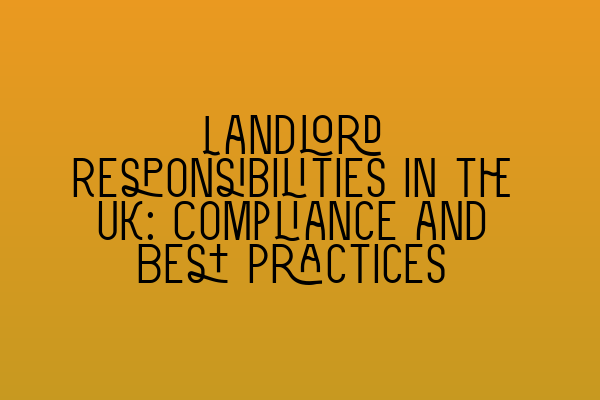Landlord Responsibilities in the UK: Compliance and Best Practices
As a landlord in the UK, it is crucial to understand and comply with your responsibilities to ensure a smooth and successful tenancy. Failing to meet these responsibilities can lead to legal issues, financial penalties, and even damage to your reputation as a landlord. In this article, we will discuss the key responsibilities of a landlord in the UK and provide you with best practices to ensure compliance.
1. Safety and Repairs:
One of the primary responsibilities of a landlord is to ensure the safety of their tenants. This includes providing a safe and habitable living environment. Landlords are legally required to maintain the property to a reasonable standard and carry out necessary repairs. This includes but is not limited to:
– Ensuring the property is free from hazards and complying with health and safety regulations.
– Regularly checking and maintaining gas appliances and electrical systems by a registered professional.
– Providing working smoke alarms and, in some cases, carbon monoxide alarms.
– Repairing any structural damage or issues that may arise during the tenancy.
By fulfilling these obligations, you not only protect your tenants but also reduce the risk of legal action being taken against you.
2. Tenancy Agreements and Deposits:
Another crucial responsibility as a landlord is to provide a tenancy agreement that clearly outlines the terms and conditions of the tenancy. This legal document protects the rights and responsibilities of both parties and helps avoid any potential disputes.
It is important to include key information such as the length of the tenancy, rent amount and payment schedule, responsibilities of the landlord and tenant, procedures for ending the tenancy, and any other relevant clauses.
Additionally, landlords are required to protect their tenants’ deposits in a government-approved tenancy deposit scheme (TDP). Failure to do so can result in penalties and leave you unable to serve a Section 21 notice to end the tenancy.
3. Energy Performance Certificates (EPCs):
Before letting a property, landlords must provide an Energy Performance Certificate (EPC) to potential tenants. EPCs provide information about the energy efficiency of the property and suggest measures to improve it. It is a legal requirement, and failure to provide an EPC can result in financial penalties.
4. Right to Rent Checks:
Landlords in the UK are obligated to carry out Right to Rent checks on prospective tenants. This means verifying the immigration status of tenants to ensure they have the right to rent a property in the UK.
Failure to conduct these checks can result in severe penalties, including substantial fines and even imprisonment. It is essential to familiarize yourself with the government’s guidelines on conducting Right to Rent checks to avoid any potential legal issues.
5. Regular Inspections:
Regular inspections can help ensure that the property is being well-maintained, and any issues are addressed promptly. It also provides an opportunity to build a good relationship with your tenants, addressing their concerns and maintaining good communication.
However, it is crucial to remember that tenants have the right to privacy, and you must give them proper notice before conducting an inspection. Typically, 24 to 48 hours’ notice is reasonable, but this can vary depending on the circumstances and terms of the tenancy agreement.
In addition to the aforementioned responsibilities, landlords should also be aware of requirements regarding smoke and carbon monoxide alarms, proper waste disposal, fire safety regulations, and compliance with local licensing rules if applicable.
By understanding and fulfilling your responsibilities as a landlord, you not only maintain compliance with the law but also create a positive and trustworthy reputation. This can lead to long-term tenant relationships and minimize the risk of disputes or legal actions.
If you’re preparing for the SQE 1 or SQE 2 exams, be sure to check out our related articles for practice exam questions, preparation courses, and exam dates:
– SQE 1 Practice Exam Questions
– SQE 1 Practice Mocks FLK1 FLK2
– SQE 2 Preparation Courses
– SQE 1 Preparation Courses
– SRA SQE Exam Dates
These resources will provide you with the necessary knowledge and preparation to excel in your examinations.
Remember, being a responsible landlord goes beyond legal obligations. It is about creating a safe and comfortable environment for your tenants, fostering good relationships, and providing a quality living experience.
